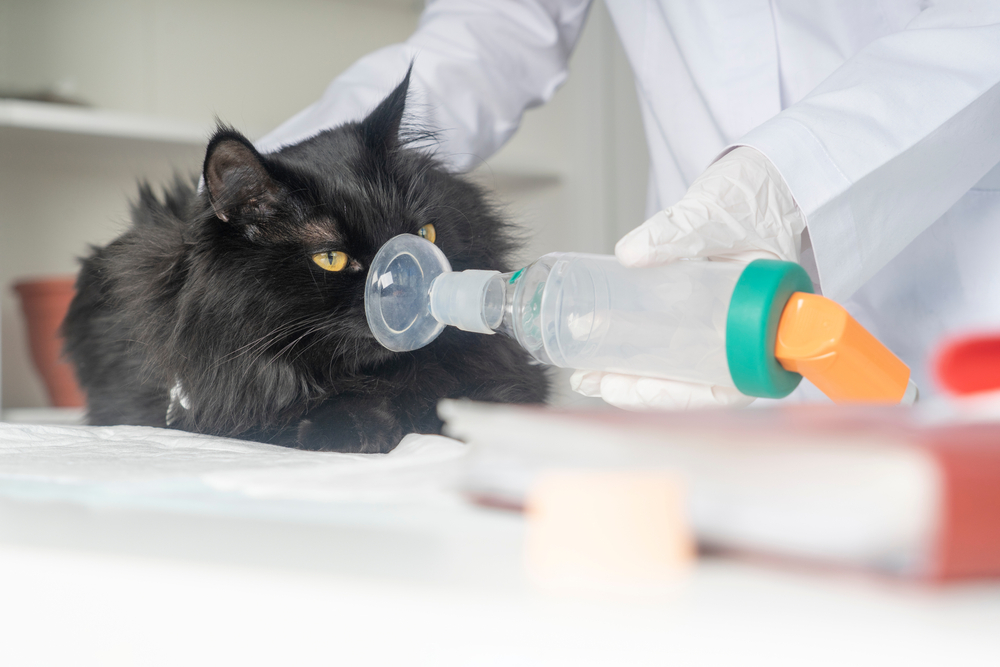What is Feline Asthma?
Feline asthma is a chronic inflammatory disease affecting a cat’s airways, much like asthma in humans. When triggered, the airways narrow, and mucus production increases, making it difficult for your cat to breathe. The severity of asthma can range from mild coughing to life-threatening respiratory distress, so early detection is key.
Common Causes and Triggers
Feline asthma is often triggered by allergens in the environment. Here are some common culprits:
- Tobacco smoke: A major irritant for sensitive airways.
- Dust, pollen, and mold: Airborne allergens that may provoke asthma attacks.
- Household chemicals: Perfumes, cleaning sprays, and even air fresheners can be problematic.
Some breeds of cats are genetically more predisposed to asthma, so keeping a clean, allergen-free environment can help reduce attacks. For further insights, visit the Cornell Feline Health Center’s guide on feline asthma.
How Can You Recognize Asthma in Cats?
Asthma symptoms can mimic other conditions, so it’s essential to recognize the key signs:
- Coughing or wheezing: This can sometimes be mistaken for trying to cough up a hairball.
- Rapid or labored breathing: If your cat’s breathing appears strained or faster than usual, this may be a red flag.
- Hacking: Regular hacking without hairball expulsion could indicate asthma.
If your cat displays any of these signs, note them down. Having this information ready can be incredibly helpful during your vet visit.
Diagnosing and Treating Feline Asthma
At Peak City Veterinary Hospital, we use a range of diagnostic tools to pinpoint feline asthma:
- X-rays: These help us visualize the lungs and airways to detect any abnormalities.
- Blood tests: We may check for underlying infections or allergens that could be contributing to your cat’s condition.
Treatment options for feline asthma include:
- Inhalers: Specially designed inhalers for cats deliver medication directly to the lungs to open airways and reduce inflammation.
- Corticosteroids: These medications help manage inflammation, reducing the frequency and severity of asthma attacks.
- Environmental management: Removing allergens and maintaining a clean, dust-free home can significantly reduce asthma flare-ups.
Preventing Asthma Attacks
Preventing asthma attacks starts with reducing exposure to triggers. Here are some key tips:
- Clean regularly: Dusting and vacuuming your home helps minimize airborne allergens.
- Avoid smoking indoors: A smoke-free environment is crucial for asthmatic cats.
- Routine veterinary visits: Regular check-ups help monitor your cat’s condition and adjust treatments as needed. For more on this, visit our Preventative Care Services.
Managing Feline Asthma at Home: Tips and Best Practices
Keeping your cat comfortable with asthma involves more than medications—it’s about creating a pet-friendly environment that minimizes flare-ups. Here’s how you can create a safer space for your cat and effectively reduce asthma triggers right at home:
1. Optimize Air Quality
One of the most effective ways to reduce asthma symptoms is to focus on the air quality inside your home. Airborne allergens, from dust to pollen, can often be the culprits behind flare-ups. Here are some actionable steps:
- Invest in an Air Purifier: HEPA-filter air purifiers can capture small particles, making it easier for your cat to breathe freely. Place these in areas where your cat spends most of its time.
- Ventilation is Key: Regularly ventilate the house to reduce indoor air pollutants. If possible, avoid opening windows during peak pollen times to prevent outside allergens from entering.
- Regular Cleaning: Dust, sweep, and vacuum often. A vacuum with a HEPA filter will trap more allergens and prevent them from circulating back into the air. Don’t forget to vacuum furniture and carpets where allergens can accumulate.
2. Mind Your Cleaning Products
Certain cleaning supplies can trigger asthma symptoms in sensitive cats. Switching to pet-safe products can significantly lower asthma risks:
- Use Natural or Hypoallergenic Cleaners: Look for products free from strong chemicals and scents, which can irritate your cat’s airways. Many pet stores offer cat-safe options, or you can opt for diluted vinegar solutions as an alternative.
- Limit Aerosol Sprays: Aerosols can be particularly irritating. When cleaning, try to keep your cat out of the area until the air has cleared.
3. Choose Dust-Free Litter
Cat litter can be a surprising asthma trigger, especially varieties that produce a lot of dust. To keep your cat’s airways clear, choose a litter that’s specifically designed to minimize dust.
- Opt for Low-Dust or Dust-Free Litter: Clumping and clay-based litters often produce dust clouds, which can exacerbate asthma symptoms. Silica gel or pellet litters are often a better choice.
- Avoid Scented Litter: The fragrance in scented litter can be as triggering as dust. Instead, go for unscented options to keep your cat’s environment as neutral as possible.
4. Monitor Seasonal Allergens

If your cat’s asthma worsens at certain times of the year, seasonal allergens like pollen might be to blame. By tracking these changes, you can help prevent flare-ups:
- Limit Outdoor Time During High Pollen Seasons: If your cat enjoys supervised outdoor time, consider adjusting the schedule to avoid high pollen days.
- Keep Windows Closed: During spring and fall, try to keep windows shut and rely on filtered indoor air instead.
5. Practice Stress Management
Just like in people, stress can worsen asthma symptoms in cats. A calm, routine environment can help:
- Create a Safe Space: Set up a quiet, comfortable area for your cat, complete with their bed, favorite toys, and scratching posts. This area should be free from high-traffic zones and sudden noises.
- Stick to Routines: Cats thrive on routine, and reducing changes in their daily life can help decrease stress, potentially easing asthma symptoms.
Why Choose Peak City Veterinary Hospital?
At Peak City Veterinary Hospital, our experienced team is here to provide comprehensive, compassionate care for cats with respiratory issues like asthma. We understand how worrisome these conditions can be and offer personalized treatment plans to ensure your cat can live a comfortable, healthy life. You can meet our dedicated team on our Meet the Team page.
Feline asthma is a serious condition, but with the right treatment and preventive measures, many cats live long, happy lives. If your cat shows any signs of asthma, don’t wait—reach out to us. Request an Appointment at Peak City Veterinary Hospital today, and we’ll ensure your cat gets the care they deserve.









Leave A Comment